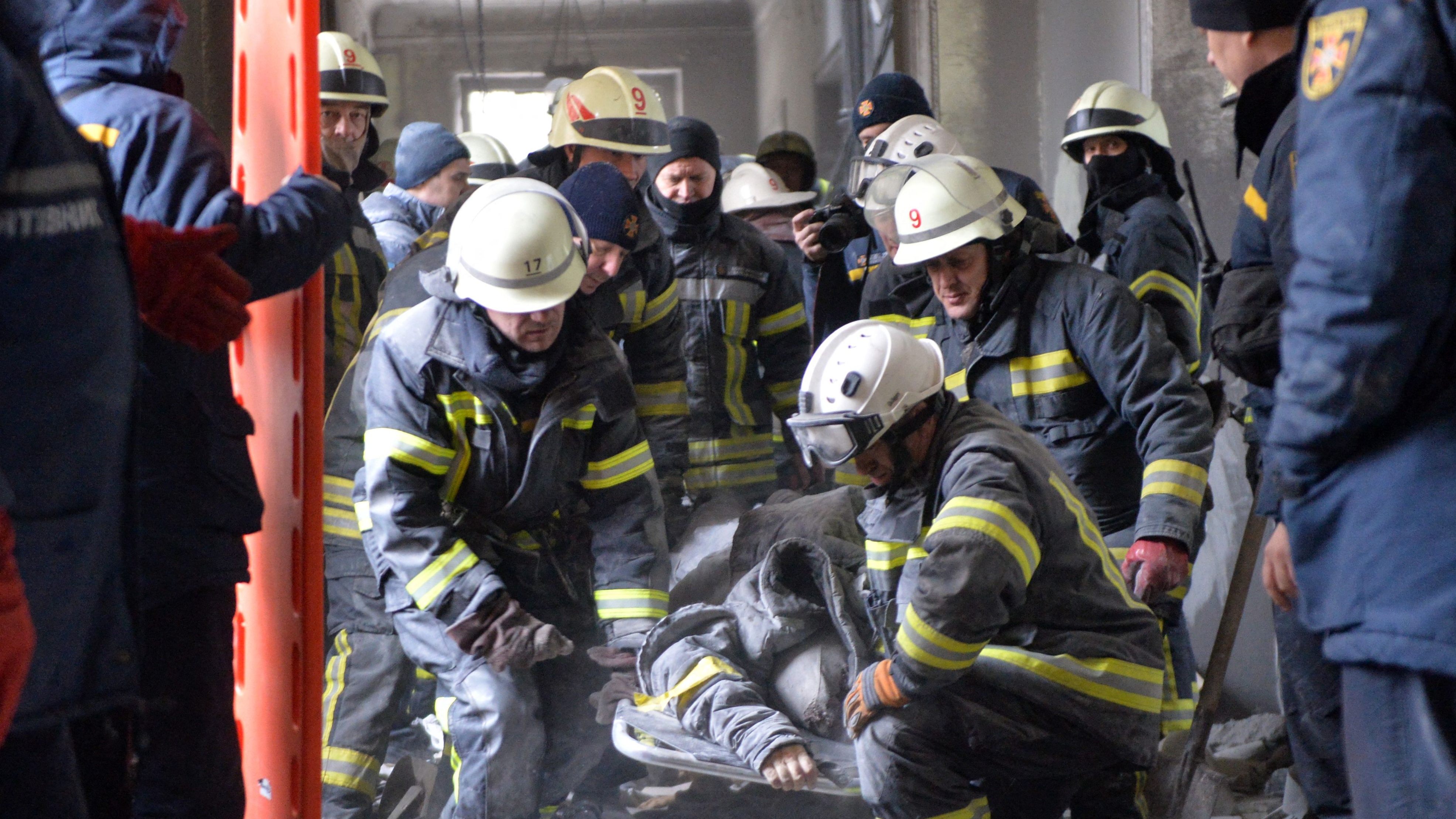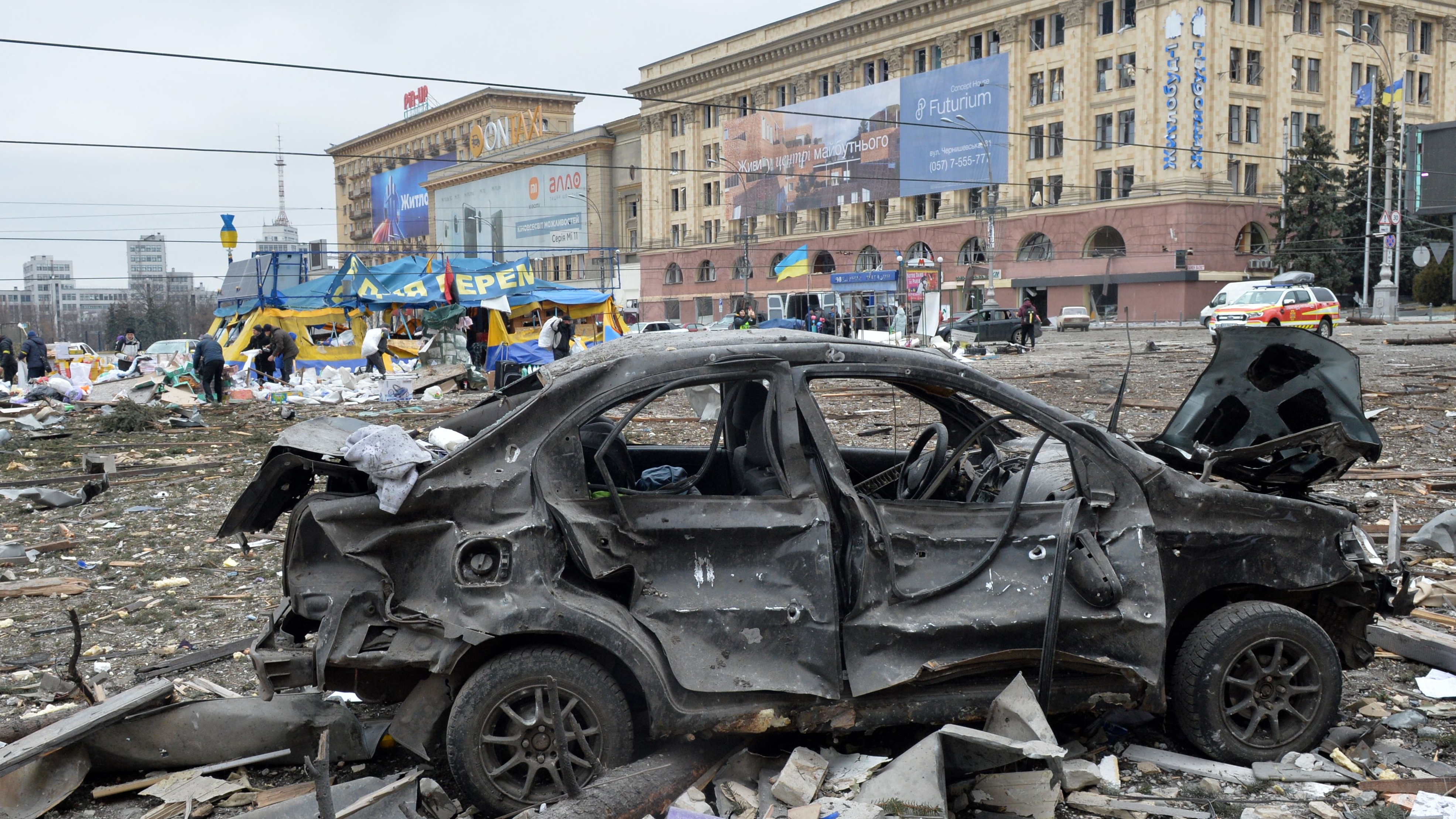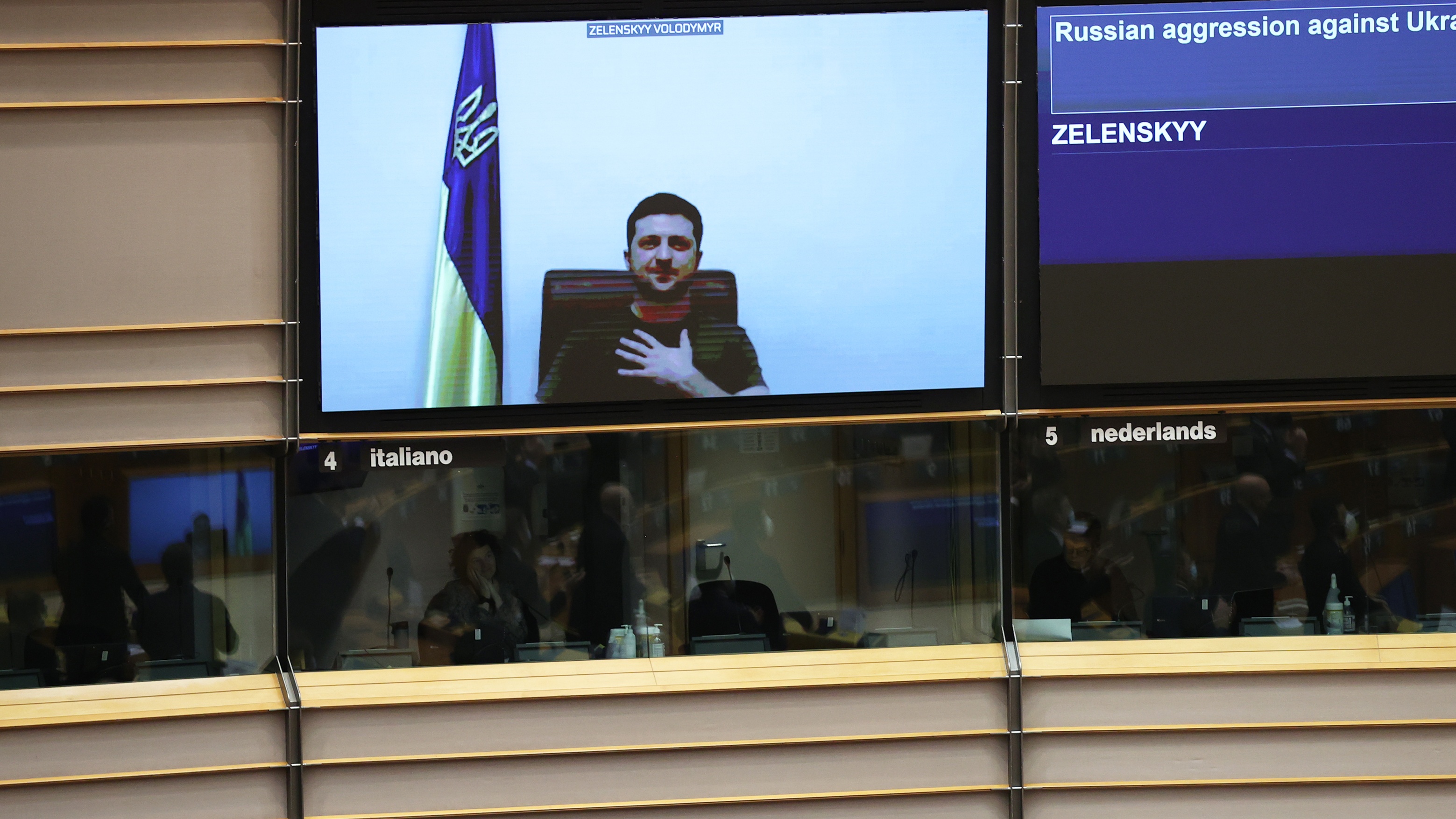Has Russia committed war crimes in Ukraine?
Moscow accused of using illegal vacuum bomb during attempted invasion

A free daily email with the biggest news stories of the day – and the best features from TheWeek.com
You are now subscribed
Your newsletter sign-up was successful
The International Criminal Court (ICC) is to open an investigation into possible war crimes and crimes against humanity by Russia in Ukraine “as rapidly as possible”, the organisation’s chief prosecutor has announced.
Karim Khan said in a statement that the government in Kyiv had awarded jurisdiction to the Hague-based court despite not being a member of the ICC. “I have already tasked my team to explore all evidence preservation opportunities,” he added.
The announcement follows claims by Oksana Markarova, Ukraine’s ambassador to the US, that Moscow deployed an illegal vacuum bomb in a bid to crush the fierce resistance to its invasion of the neighbouring nation.
The Week
Escape your echo chamber. Get the facts behind the news, plus analysis from multiple perspectives.

Sign up for The Week's Free Newsletters
From our morning news briefing to a weekly Good News Newsletter, get the best of The Week delivered directly to your inbox.
From our morning news briefing to a weekly Good News Newsletter, get the best of The Week delivered directly to your inbox.
‘Fighting must stop’
British-born lawyer Khan said he was “satisfied that there is a reasonable basis to believe that both alleged war crimes and crimes against humanity have been committed in Ukraine”.
His “next step” would be to refer the investigation to ICC judges in order to get approval for the inquiry, he continued, although an “alternative route” that could “further expedite matters” would be for an ICC member state to refer the case to his office.
This “would allow us to actively and immediately proceed with the office’s independent and objective investigations”, Khan said.
A growing number of high-profile figures are calling for Russia to be formally investigated. Lithuania’s Prime Minister Ingrida Simonyte told The Washington Post on Monday that “what Putin is doing, it is just a murder and nothing else. I hope he will be in Hague.”
A free daily email with the biggest news stories of the day – and the best features from TheWeek.com

The United Nations General Assembly has also met to discuss the crisis, “after Russia vetoed a UN Security Council (UNSC) draft resolution on Friday that would have condemned the invasion”, Al Jazeera reported.
“The fighting in Ukraine must stop. It’s raging across the country from air, land and sea. It must stop now,” UN Secretary-General Antonio Guterres told the assembly on Monday. “The guns are talking now, but the path of dialogue must always remain open.”
The policymaking body “is expected to vote on a draft resolution denouncing the invasion later this week”, according to the broadcaster, which noted that “Russia and the other four permanent members of the UNSC do not have veto power at the General Assembly”.
Dirty war
The deployment of a vacuum bomb, also known as a thermobaric weapon, could “constitute a war crime” if “used in a civilian setting”, Politico reported. The weapons work by “taking in oxygen to create powerful, high-temperature explosions”.
Moscow deployed a vacuum bomb that destroyed a Ukrainian army base in the northeastern town of Okhtyrka, killing 70 soldiers, according to a post on the Telegram account of Sumy region administrative chief Dmytro Zhyvytskyy.
Graphic images of the aftermath of the attack showed the flattened building being inspected by troops, and part of the body of a man torn apart by the explosion.
Asked about Russia’s reported use of vacuum bombs, White House Press Secretary Jen Psaki told reporters on Monday that “if that were true, it would potentially be a war crime”.
The government in Kyiv is also preparing an ICC case against Moscow, amid “mounting” evidence that Russia is using “indiscriminate cluster munitions” and “levelling residential buildings in Kharkiv”, Ukraine’s second biggest city, The Guardian reported.
Ukraine “has also taken Russia to the International Court of Justice (ICJ) for having launched an invasion on the pretext of false claims of genocide perpetrated against the country’s Russian speakers”, the paper added.
The ICJ case “is kind of a symbolic move by Ukraine”, said David Bosco, an expert on international justice at Indiana University. “That’s not going to yield very much because it’s not actually clear that ICJ is going to have jurisdiction.”
Russian missiles yesterday hit what the BBC described as “the cultural heart” of Kharkiv, in what officials labelled a “cruel” attack. An opera house, concert hall and government offices were hit in Freedom Square, the second largest city-centre square in Europe.
Ukraine’s President Volodymyr Zelenskyy repeated the war crime allegations against Russia following the attack, telling the European Parliament that “this is the price of freedom”.
“This is terror against Ukraine,” he continued. “There were no military targets in the square – nor are they in those residential districts of Kharkiv which come under rocket artillery fire.”

Groups including investigative journalism agency Bellingcat are “working with other organisations to preserve evidence that would be accepted” in a future war crimes or crimes against humanity tribunal, The Guardian reported.
“We’ve been working on issues related to accountability using open source evidence for a long time, so we’re very familiar with the needs of stakeholders like the ICC,” Bellingcat founder Eliot Higgins told the paper.
“Our goal would then be to make that data available to any accountability process that wants to use it.”
-
 What to know before filing your own taxes for the first time
What to know before filing your own taxes for the first timethe explainer Tackle this financial milestone with confidence
-
 The biggest box office flops of the 21st century
The biggest box office flops of the 21st centuryin depth Unnecessary remakes and turgid, expensive CGI-fests highlight this list of these most notorious box-office losers
-
 The 10 most infamous abductions in modern history
The 10 most infamous abductions in modern historyin depth The taking of Savannah Guthrie’s mother, Nancy, is the latest in a long string of high-profile kidnappings
-
 What happens now that the US-Russia nuclear treaty is expiring?
What happens now that the US-Russia nuclear treaty is expiring?TODAY’S BIG QUESTION Weapons experts worry that the end of the New START treaty marks the beginning of a 21st-century atomic arms race
-
 Epstein files topple law CEO, roil UK government
Epstein files topple law CEO, roil UK governmentSpeed Read Peter Mandelson, Britain’s former ambassador to the US, is caught up in the scandal
-
 Iran and US prepare to meet after skirmishes
Iran and US prepare to meet after skirmishesSpeed Read The incident comes amid heightened tensions in the Middle East
-
 Israel retrieves final hostage’s body from Gaza
Israel retrieves final hostage’s body from GazaSpeed Read The 24-year-old police officer was killed during the initial Hamas attack
-
 China’s Xi targets top general in growing purge
China’s Xi targets top general in growing purgeSpeed Read Zhang Youxia is being investigated over ‘grave violations’ of the law
-
 Ukraine, US and Russia: do rare trilateral talks mean peace is possible?
Ukraine, US and Russia: do rare trilateral talks mean peace is possible?Rush to meet signals potential agreement but scepticism of Russian motives remain
-
 Panama and Canada are negotiating over a crucial copper mine
Panama and Canada are negotiating over a crucial copper mineIn the Spotlight Panama is set to make a final decision on the mine this summer
-
 The rise of the spymaster: a ‘tectonic shift’ in Ukraine’s politics
The rise of the spymaster: a ‘tectonic shift’ in Ukraine’s politicsIn the Spotlight President Zelenskyy’s new chief of staff, former head of military intelligence Kyrylo Budanov, is widely viewed as a potential successor